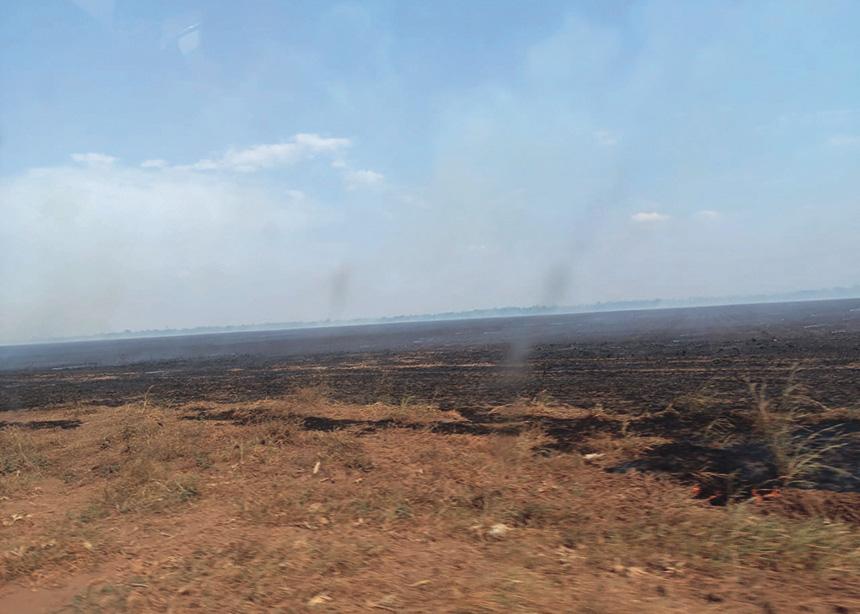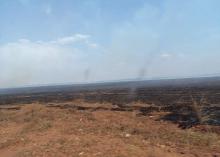For many Latin American colony Mennonites, a life of isolation, farming and family is the fulfilment of God’s will, but for others, it is the destruction of sacred lands.
Various Mennonite colonies in different parts of Latin America have been accused of deforestation and unlawful encroachment by local Indigenous peoples in recent years. Three colonies in the municipality of Puerto Gaitán in central Colombia are among those accused.
The three colonies, established in 2015, are some of the more recent of the many Mennonite colonies established in Latin America since the start of the 20th century. The colonies established more than 100 years ago have grown in both population and land mass. With increasing population, colonies split, expand and relocate.
According to a study published in a 2021 issue of the Journal of Land Science, there are 214 Mennonite colonies in nine Latin American countries. These colonies take up an estimated 3.9 million hectares of land, an area larger than the Netherlands. Yann le Polain de Waroux, a geography professor at McGill University in Montreal, served as the lead author of the study, entitled, “Pious pioneers: The expansion of Mennonite colonies in Latin America.”
The study found that, because of the remote areas that colony Mennonites choose to settle, and because of their farming systems, they have had a unique and significant impact on the agricultural life of the continent.
Like Latin American peasant farmers, their farms are often small and are managed by families, but, like large-scale farmers, they build roads to access their remote settlements and move their acquired capital and knowledge to new locations throughout Latin America.
Their preference for settling remote locations is based on a religiously inspired desire to remain as separate as possible from the outside world. Their road-building and farming methods, which require tree cutting, greatly alter the landscapes on which they settle, and make it possible for other farmers with similar methods to also use this land.
The arrival of new farmers, and thus the loss of physical separation from those outside their colony, often prompts the relocation of a colony to a new remote territory.
An investigation carried out by Mongabay, and fellow conservation organizations Rutas del Conflicto and El Deber, found evidence of Mennonite colonies in Bolivia, Colombia, Mexico, Paraguay and Peru logging forests without authorization, occupying Indigenous community territories, trafficking land and issuing threats.
In Paraguay, for example, Mennonite colony machinery cleared out three hectares of forest and demolished an estuary in the Pindo’i community reserve, according to a lawsuit filed by a local Indigenous person.
The acquisition of land by a Mennonite colony in Tiruntán, Peru, was revealed to have included land trafficking, and meetings between colony leaders and lawyers in upper political spheres legalizing their occupation.
And while Mennonites in the Meta department of Colombia committed to recovering the forests they have logged, the Sikauni Indigenous communities that first issued this claim, said this deforestation hasn’t ended.
Corporación Claretiana Norman Pérez Bello (CCNPB), an organization that works to defend the human rights of Indigenous and peasant communities in the Orinoquía region, or eastern plains, of Colombia, has raised concerns about the Mennonite colonies settled in Puerto Gaitán specifically.
During a video call convened in March by the U.S.-based, Mennonite-rooted Coalition to Dismantle the Doctrine of Discovery, CCNPB’s Sebastian Vargas said the idea these Mennonites have acquired and treated the land in a way that respects Colombian law is a “fictional argument.”
According to Vargas, while each of the individual families of one colony do indeed own a legal amount of land, they all contribute to the agricultural production of the same colony, with this colony therefore operating as a company with multiple times the amount of land any one party can legally own.
According to Indigenous representatives on the call, the Mennonite colonies in Puerto Gaitán have begun monoculture farming, impeding upon Indigenous farming methods, and have illegally burned portions of this land. They have also reportedly begun preparing land beyond what they own for farming.
As tensions rise between these Mennonite colonies and the local Indigenous peoples hoping to protect and return to their traditional land, Mennonite colony members have reportedly told Indigenous peoples they will send armed people to remove them from the area.
To Vargas, the Mennonite colonies’ settlement in Puerto Gaitán eight years ago, and their treatment of the land since then, makes them part of the area’s long history of Indigenous displacement, and now land mistreatment.
In a subsequent email, Vargas said Mennonite agricultural activity has damaged aquifers. He also noted that, while colonies have the means to import equipment, they do not share or collaborate with Indigenous communities.



Add new comment
Canadian Mennonite invites comments and encourages constructive discussion about our content. Actual full names (first and last) are required. Comments are moderated and may be edited. They will not appear online until approved and will be posted during business hours. Some comments may be reproduced in print.